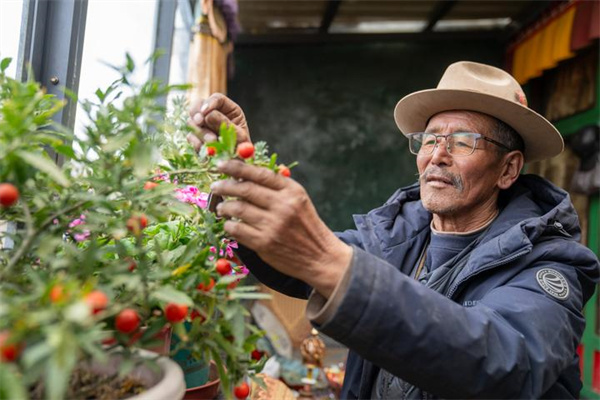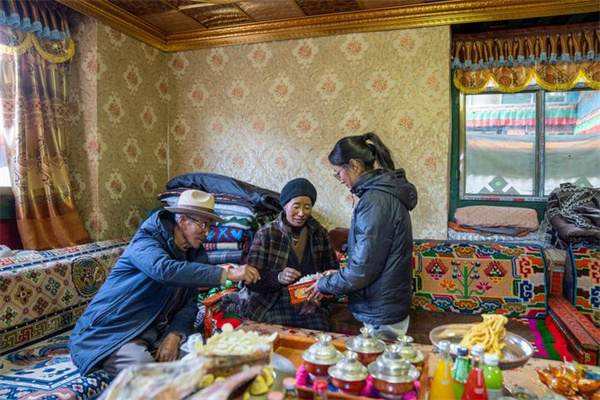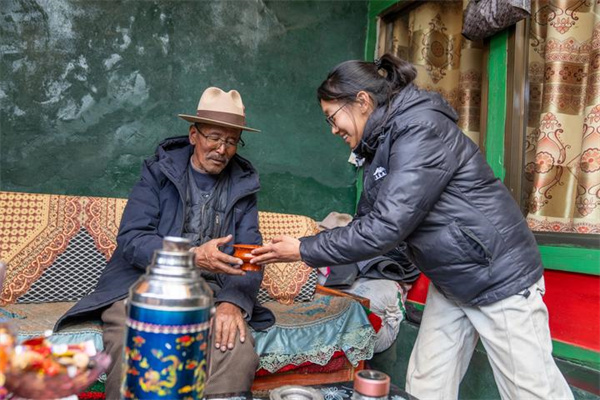From serfdom to freedom, new life arising from old Xizang manor
Updated: 2024-03-25 (Xinhua)  Print
Print 



Tseten tends to his plants at home in Qonggyai county in Shannan, Southwest China's Xizang autonomous region, Feb 22, 2024. [Xinhua/Tenzing Nima Qadhup]
LHASA -- Had it not been for democratic reform 65 years ago, Tseten from Southwest China's Xizang autonomous region would have been sold by his master and separated from his parents.
At 13, an age when serf children were traded among manors, the Tibetan boy was about to be brought to the market for trading when democratic reform in March 1959 abolished the feudal serfdom system in the region, freeing some 1 million people.
"Compared with those who were sold and even tortured to death, I was rather fortunate," said Tseten, now 78, who lives in a villa near the former manor his family used to serve in Qonggyai county in the city of Shannan.
Last year, the county government invested 4 million yuan ($563,841) in renovating the manor based on its original appearance and is planning to turn it into a tented camp, where visitors can get a glimpse of the miserable lives endured by serfs before they were set free.
Born into the lowest rank of serfs, Tseten lived in a livestock shed at the manor, sharing space with sheep and their manure. At night, he was often awakened due to a sheep stepping on him.
He revealed that leftovers from the masters' dining table were for the maids to eat, while all the serfs had to eat was soup made of barley flour -- soup as clear as water.
"I had to eat after my parents because they had heavy labor to do," Tseten recalled, with memories of hunger still haunting him.
Back then, Tseten's parents were muleteers at the manor, using mules to transport farming yields like barley flour and yak butter to the city of Lhasa. Sometimes, robbers would steal their goods on the way.
"I remember my father being tied to the stairs and whipped after being robbed," he said.
Following democratic reform in 1959, Tseten and his family, together with another household, moved from the sheep pen to the manor owner's rooms on the second floor of the manor.

Tseten (L) and his family members enjoy some snacks at home in Qonggyai county in Shannan, Southwest China's Xizang autonomous region, Feb 22, 2024. [Xinhua/Tenzing Nima Qadhup]
His family was allocated farmland, one head of cattle, a donkey and seven sheep. Thanks to the reform, Tseten was able to go to school at the age of 15 and, after graduating from high school, he returned home to farm.
Now, Xizang is the first provincial-level region in China to provide 15 years of publicly-funded education from kindergarten to senior high school, a stark contrast to the situation seven decades ago when access to education was limited to the nobility.
In 2003, Tseten's family moved to a hill opposite the old manor and built a 90-square-meter house. Three years later, with a subsidy of 10,000 yuan provided by Shannan's housing project, the house was expanded into a villa of about 230 square meters in size.
Tseten lives on the second floor with one of his daughters, while his son-in-law, a migrant worker employed outside the county, earns more than 30,000 yuan a year. One of Tseten's sons became a doctor in a hospital in Shannan after graduating from college.
Despite his age, Tseten is in good health. He likes taking care of the plants on his balcony, watching almost every cultural performance organized in his village and even traveling to the regional capital Lhasa to visit his relatives and explore.
"I am lucky to witness such a new era in this region," said Tseten, adding that he also receives a monthly pension of 260 yuan, while his hospital bills for minor eye and stomach problems are mostly covered by public healthcare.

Tseten's granddaughter serves a cup of butter tea for Tseten at home in Qonggyai county in Shannan, Southwest China's Xizang autonomous region, Feb 22, 2024. [Xinhua/Tenzing Nima Qadhup]
According to a white paper issued in 2023, a total of 3.43 million people were covered by basic medical insurance in this region, more than 95 percent of the total population there.
Nyidron, Tseten's granddaughter, is a freshman at Fujian Normal University in the coastal province of Fujian in east China, a place her family had never been to before. Nyidron returns home during the winter and summer vacations.
She said she used to go to the old manor in summer to escape the heat, stargazing on the rooftop and marveling at the twinkling lights of villages in the distance.
She can still recall her deep sorrow when she first saw the dark walls, stairs and pillars of the old manor.
"The manor reminded me of the suffering of my grandfather in the past. Those miserable days are now gone, but I will always remember them," said Nyidron.
(Xinhua correspondents Kelsang Paljor, Tenzing Nima Qadhup and Wei Guanyu contributed to the story.)








